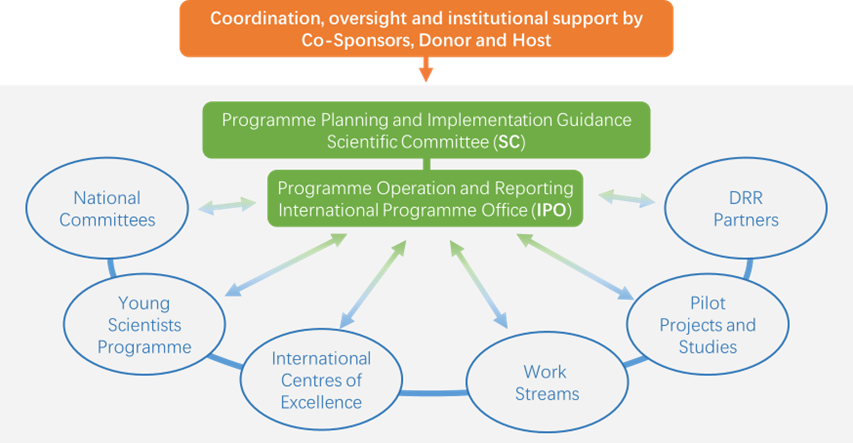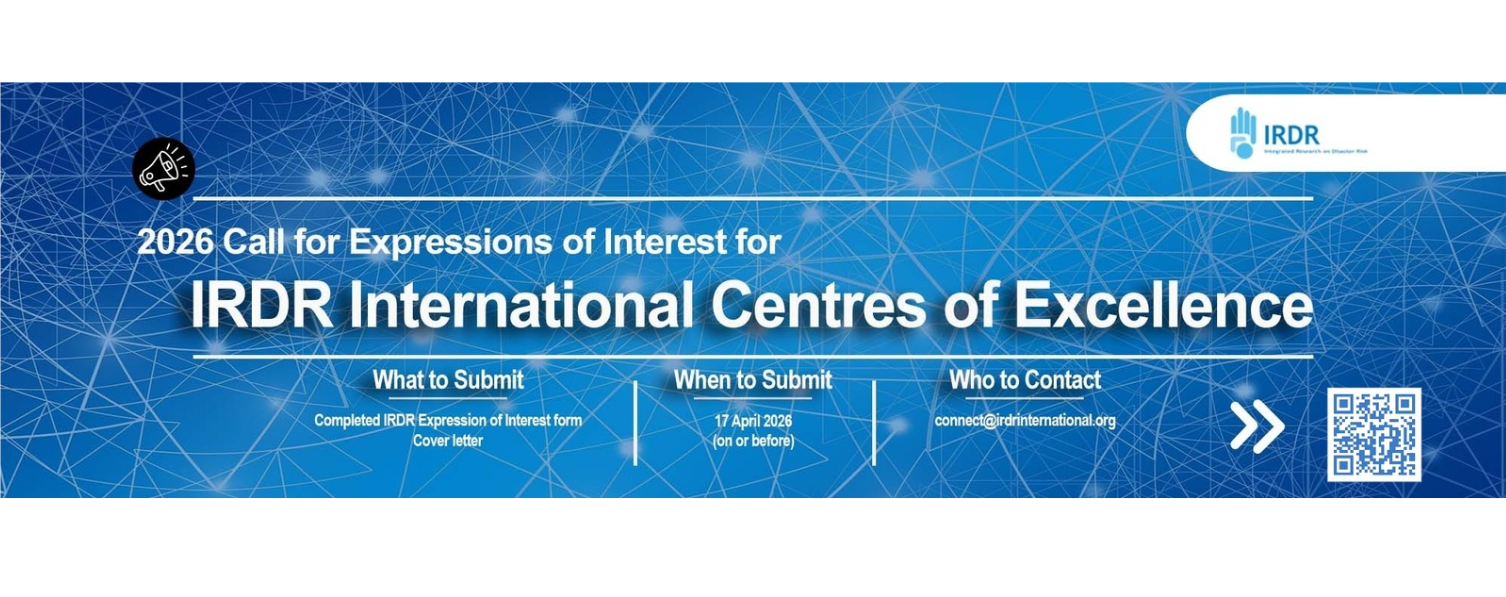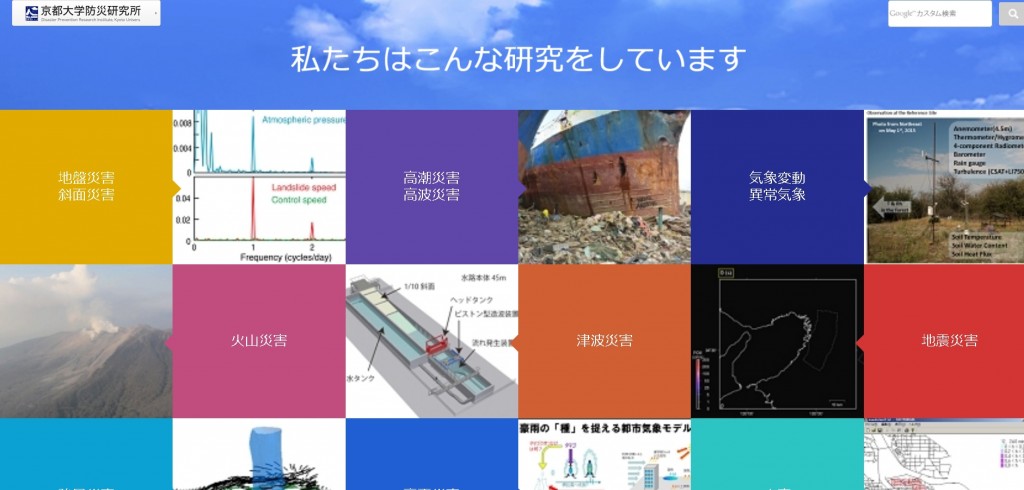Context and justification
Discussion about the extension of IRDR has been ongoing since 2016. The 2016 mid-term review of IRDR indicated that, “if the programme made good progress in the implementation of its recommendations, it should be extended to 2025”. In September 2019, anticipating the completion of IRDR in 2020, the Coordination Committee of IRDR decided that the future arrangements for IRDR would be made upon the success of a) the compilation of IRDR’s work in its first 10 years, and b) the establishment of a new global DRR research agenda, within which IRDR would be repositioned.
Since October 2019, the IRDR community has been working on these two major tasks, and now both are successfully completed. IRDR 2010-2020 Compilation, launched at the 2021 IRDR International Conference, has assembled contributions from most members of IRDR community. It evidences IRDR’s main achievements, experience and progress as well as the lessons learned and indicates the need for cooperation in the future. The products and services of IRDR include research papers and reports, policy briefs, standards and methods for data, models of disaster risk analysis, as well as science policy dialogue and technical training, making it a valuable knowledge generation resource toward the goals and targets of the Sendai Framework.
In 2022, there are 18 IRDR International Centres of Excellence, 13 IRDR National Committees, 1 IRDR regional committee, and a network of IRDR Young Scientists from over 40 countries. Partnership between IRDR and international, regional, national as well as thematic research networks has been growing steadily. IRDR has become a scientific community for integrated DRR research and action, a fact further confirmed by broad participation in the IRDR 2021 International Conference.
The new global DRR research agenda, now entitled “A Framework for Global Science in Support of Risk-informed Sustainable Development and Planetary Health” (referred as the Framework below), was developed in 2020 and 2021. Facing the dynamic risk landscape and growing recognition of the systemic nature of risk, the Framework has identified nine broad research priorities. While this has gone beyond the original research objectives of IRDR in its 2008 Science Plan, the priorities in the Framework recognize that understanding the nature and characteristics of risk, and how science can promote policy change, remain the essential challenges for the science community. The Framework was adopted at the 2nd ISC General Assembly in Oct 2021.
Duration of IRDR Phase II
The new phase of IRDR (IRDR Phase II) will last for 10 years, starting from 2022 and ending in 2031 with a review in year 5. This takes IRDR through the end of the implementation of the Sendai Framework and other related UN 2030 Agreements.
Sponsorship, Donorship and Host
IRDR Phase II will be under a joint sponsorship of ISC and UNDRR, with the donorship of CAST. CAS and its AIR will host IRDR IPO in Beijing, P.R. China.
Mission and objectives
IRDR’s mission is to mobilize science for the reduction of all types of disaster risk; building resilience and reducing vulnerability by integrating risk science with climate change adaptation and mitigation and sustainable development. IRDR aims to usher in an inclusive, safe and sustainable world by promoting a better understanding of disaster risk and effective use of risk science in decision-making.
The new mission requires IRDR to bring together expertise from sciences, technologies, engineering and more. Engaging and working with relevant stakeholders, IRDR will:
- improve knowledge and understanding of risk and uncertainty that hamper progress toward inclusive, safe and sustainable development;
- promote innovation in research and action, and explore effective solutions in DRR; and
- build institutional capacity required under various socio-economic and cultural settings and development contexts for risk-informed sustainable development.
IRDR will deliver its mission within the research priorities of the Framework.
Research Priority Setting of the Research Framework:
Priority 1: Understand risk creation and perpetuation in the contemporary risk landscape: systemic, cascading, and complex risk
Priority 2: Address inequalities, injustices, marginalisation and vulnerabilities
Priority 3: Enable transformative governance and action to reduce risk
Priority 4: Understand the implications of new thinking on hazards
Priority 5: Harness technologies, innovations, data and knowledge for risk reduction
Priority 6: Support regional and national science and knowledge for policy and action
Priority 7: Support just and equitable transitions, adaptation and risk reduction
Priority 8: Measurement to help drive progress
Priority 9: Foster a transdisciplinary approach and multi-stakeholder collaboration for solutions to risk challenges
Specific action plans will be developed, based on its evolving science capacity and research strengths, by IRDR governance bodies in accordance with the mission and main functions of IRDR. IRDR ICoEs, NCs and Young Scientists will contribute from their respective fields of expertise through planned actions.
Main Functions and Expected Impact
IRDR is proposed to have following main functions:
- Coordinating international research
Accelerate action in support of the new research agenda outreach and implementation. IRDR will guide the implementation, facilitation and outreach of the Framework. This is in terms of a) accelerating action to implement the Framework and facilitate the participation of DRR partners to this end; b) to carry out the corresponding tasks and services expected by the IRDR governance bodies; c) to conduct outreach efforts for the Framework, including at the Global Platforms for Disaster Risk Reduction and other related global and regional platforms; and d) to contribute to the Mid-term and Final Reviews of SFDRR.
It is expected by the end of 2024, the first cluster of IRDR Work Streams and IRDR Pilot Studies led or driven by different stakeholders will be established to deliver on the research priorities identified in the Framework.
IRDR Bi-annual Reports will be developed for the implementation of the Framework. The reports will bring together new science contributions in terms of findings, data products, methodologies, examples of successful scientific actions and solutions, as well as innovative initiatives to advance global risk research. The reports will be compiled with leadership of IRDR and be published one year in advance of each Global Assessment Report (GAR).
2. Working at the science-policy-practice interface
IRDR will play a catalytic role in advancing DRR related research, foresight studies, publication, advocacy and science-policy-society discourse, within the research priorities of the Framework with particular attention on emerging risk issues, challenges, and new opportunities critical for inclusive, safe and sustainable development.
IRDR will work to produce reports and other products, jointly solicited by the co-sponsors to facilitate the science-policy-society discourse. These should accelerate the exchange of ideas between countries and regions, between sectors, between different governance levels and among researchers and experts. Such dialogue will take place with ISC, UNDRR or via other related networks.
3. As an international hub of centres of excellence for risk research and capacity building
Building on the base of IRDR ICoEs (18), IRDR NCs (13) and the IRDR Young Scientists Programme established in its first decade, IRDR will further its role in fostering centres of excellence in DRR in contributing to institutional capacities in DRR, and in acting as a knowledge producer and provider of solution-oriented service. IRDR will seek partnership development and cooperation with the existing DRR institutions and networks (UNDRR STAGs, Risk KAN, U-INSPIRE, etc.).
IRDR Case Studies, Trainings and Courses will be developed through collective efforts from IRDR ICoEs and NCs, in partnership with other leading research and education institutions. These will be organised in line with the priorities of the Framework. The trainings and courses will target young professionals and the general public, with objective of narrowing the gap between science communities and DRR practitioners at different levels.
Structure and Governance






